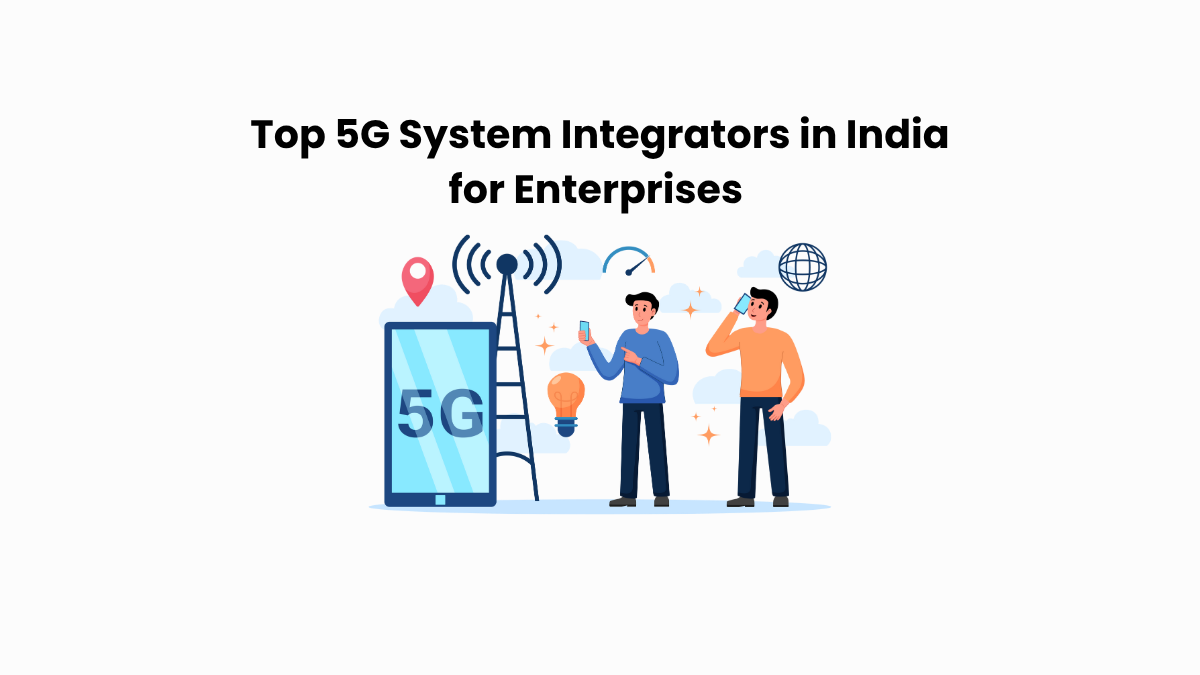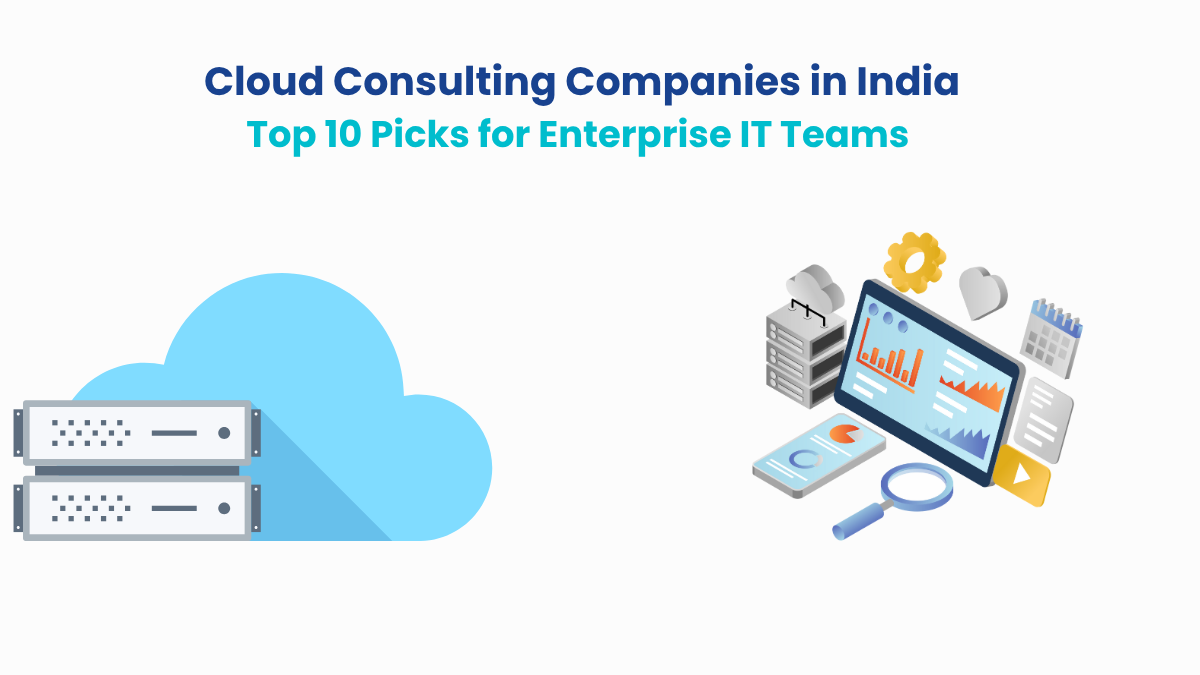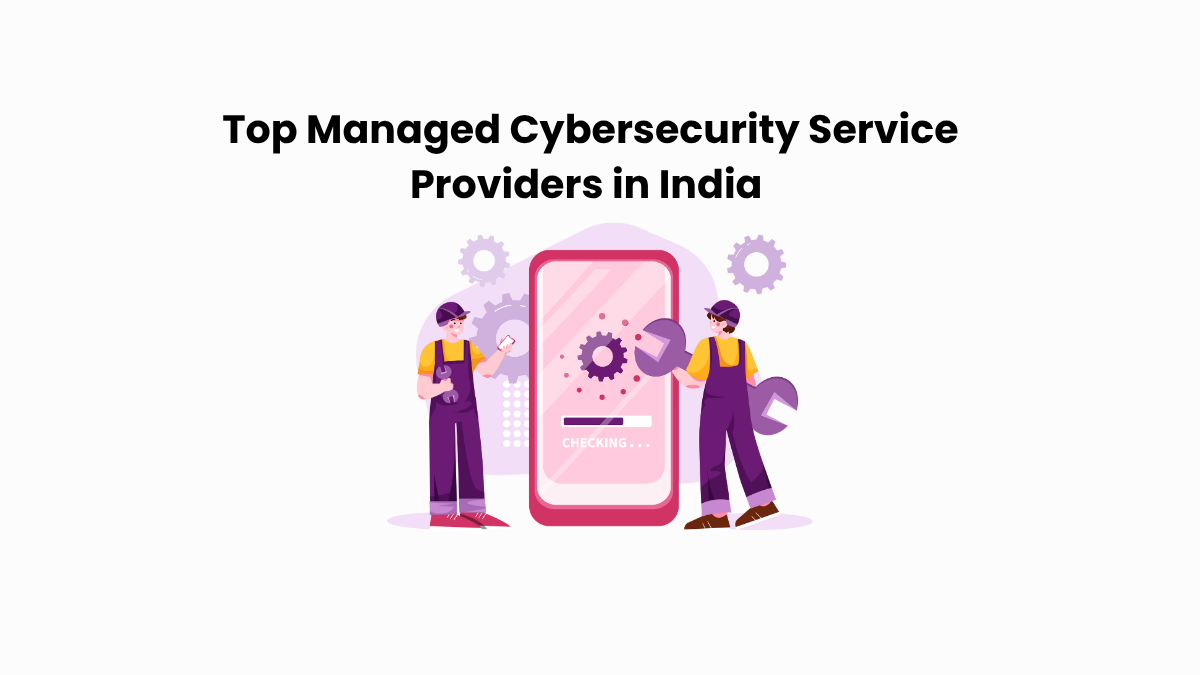5G is no longer a future rollout. It is already active across manufacturing plants, industrial hubs, logistics chains, and high-density enterprise campuses. Some organizations led the charge early. Others are now racing to match the performance gains that 5G enables. This means faster communication, real-time analytics, and ultra-reliable connectivity at the edge.
However, one truth has remained consistent throughout every phase of adoption. 5G only works as well as it is integrated.
The biggest wins in 5G are not coming from the hardware itself. They come from how that hardware is integrated with legacy infrastructure, enterprise security systems, cloud environments, and business-critical applications. That is where system integrators step in, not to install, but to align, orchestrate, and optimize.
This article profiles the top 5G system integrators in India. These are the firms enterprises trust to plan and execute complex 5G deployments across real environments. If you are scaling, troubleshooting, or starting fresh, these are the names that matter.
Key Factors to Look For in a 5G System Integrator
Choosing a 5G system integrator is not just about credentials. It is about finding a partner who understands the nuances of enterprise environments. This includes the legacy constraints, the interoperability issues, and the real pressures on IT and OT teams. A good integrator installs equipment. A great one makes the ecosystem work.
What sets them apart is their ability to think holistically and act precisely inside real enterprise environments. These five traits consistently separate leaders from service providers.
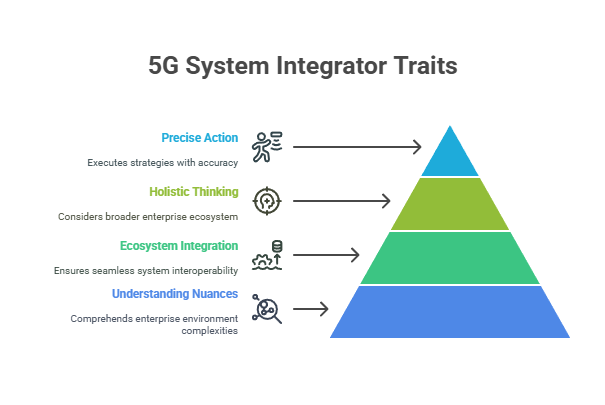
#1. Technical Alignment Across Layers, Not Just Physical Deployment
Many deployments fail because the physical rollout is treated as the endpoint. But integration happens higher up the stack. Switches must be re-architected. Routing logic must evolve to accommodate new traffic patterns. Policy enforcement needs to be aware of 5G’s behavior. A top-tier integrator works across layers from infrastructure to application to deliver actual performance.
#2. Capability to Architect for Edge, Core, and Cloud in One Fabric
5G is no longer isolated. It sits between edge compute, enterprise applications, and cloud-native services. Building around that fabric requires more than telco skills. It demands a deep understanding of how latency, data routing, and compute orchestration interact, especially when real-time workloads are involved. That complexity must be engineered with intent, not patched after deployment.
#3. Interoperability Experience Across OEMs and Infrastructure Silos
Most enterprise environments include a mix of legacy systems, modern cloud platforms, and proprietary hardware. Integrators working in this space need to broker communication across platforms that were never designed to work together. Without this ability, the network becomes brittle, i.e., it fails quickly and is difficult to repair.
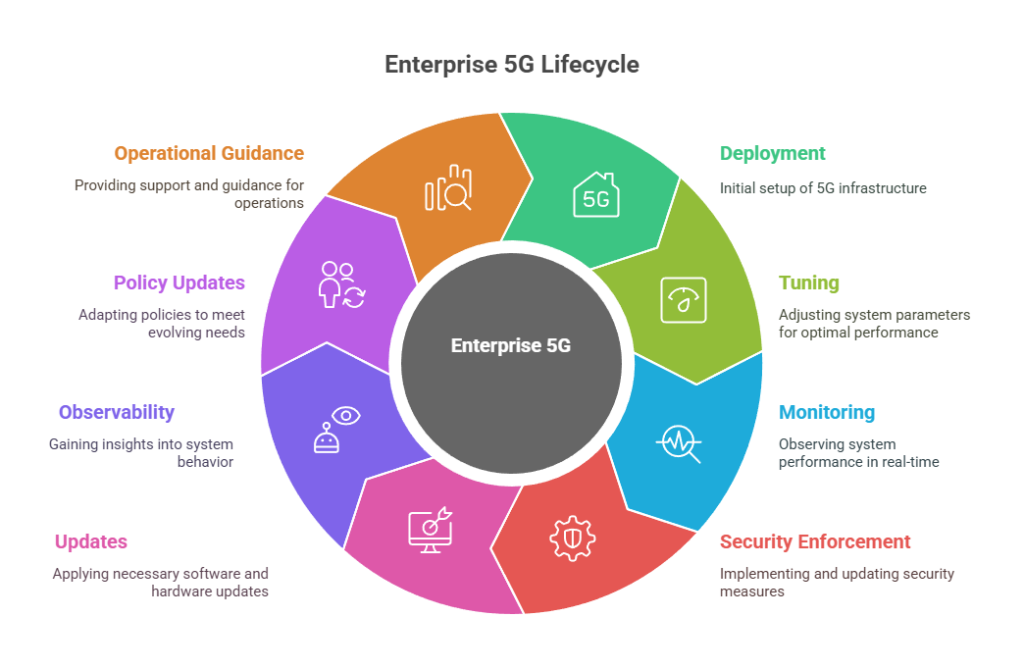
#4. Sector-Specific Integration Maturity
No two industries experience 5G in the same way. The integration path for a smart factory will differ dramatically from that of a logistics hub or a hospital network. RF behavior changes. Compliance models shift. Traffic patterns evolve. Top integrators bring contextual insight into each deployment, based on prior work in similar environments.
#5. Lifecycle Ownership Beyond Initial Go-Live
Enterprise 5G does not stop at deployment. It requires tuning, monitoring, security enforcement, and updates to keep pace with the business’s evolving needs.
The best integrators do not disappear post-installation. They stay involved through real-time observability, policy updates, and operational guidance that ensures performance scales alongside the organization.
Recommended Read: Looking to understand what can go wrong in 5G deployments? Read our guide on 7 Real-World 5G Deployment Challenges and How to Solve Them.
Top 5G System Integrators in India for Enterprises
The integration partner you choose doesn’t just impact how fast your 5G network goes live. It affects how well it performs under pressure, how easily it scales, and how smoothly it fits into your existing IT landscape.
In India, enterprise 5G adoption has picked up pace over the last two years. From manufacturing to logistics, education to energy, the momentum is clear. A few system integrators have consistently demonstrated the depth, precision, and multi-domain expertise required to achieve successful integration.
Here are nine system integrators who have earned their place on this list.
1. Datacipher
Datacipher has earned its place as one of India’s leading 5G system integrators by solving complex, real-world integration problems at scale. With deep roots in enterprise networking, security, and infrastructure transformation, Datacipher brings a systems-first mindset to every 5G deployment.
The company has worked across sectors to integrate SD-WAN, SASE, data center, and multicloud environments. This extensive experience gives it an edge when aligning 5G with enterprise operational demands.
Where most vendors focus on deployment, Datacipher focuses on outcomes. Its approach to 5G goes beyond basic network access. It examines how traffic is prioritized, how infrastructure responds under load, and how every layer must interact in real-time.
This integration depth is what separates high-performing 5G deployments from projects that stall at the pilot stage.
Datacipher’s team works across the full 5G lifecycle, from architecture planning to network rollout. It also stays involved through long-term optimization.
Whether it’s a smart factory, a nationwide enterprise, or a logistics hub needing sub-second response times, Datacipher builds for stability, performance, and adaptability.

Source – Datacipher
Below listed are the key 5G offerings:
#1. 5G Network Architecture and Redesign: We analyze and restructure your existing network stack to ensure it can support 5G workloads without bottlenecks. This includes alignment of switching, routing, segmentation, and data path optimization for real-time responsiveness.
#2. Private LTE and DAS Deployment: We deliver indoor and on-premise 5G connectivity using Distributed Antenna Systems and Private LTE. This ensures uninterrupted coverage in warehouses, manufacturing units, and multi-level facilities where traditional 5G signals often weaken.
#3. 5G Metro and Edge Integration: Our metro and edge networking solutions are built for enterprises that require ultra-low latency and distributed computing. We deploy multi-access edge nodes and ensure data moves securely and efficiently across regional footprints.
#4. Security-First 5G Rollouts: We embed security at every layer of the deployment, from device onboarding to core network access. Our designs adhere to Zero Trust principles and seamlessly integrate with existing identity, SIEM, and network monitoring systems.
#5. 5G-Optimized Data Operations: We align data flows with your enterprise application needs. This includes telemetry, video analytics, and real-time sensor data. We configure orchestration layers to prioritize critical traffic and reduce backhaul congestion.
#6. Real-Time Network Monitoring and Alerting: We implement continuous monitoring across the 5G fabric to detect anomalies, latency spikes, and service degradation before they impact operations. Dashboards are tailored for your IT team’s visibility and control.
#7. Vertical-Specific 5G Deployments: We bring hands-on experience across industries, including manufacturing, telecom, fintech, and logistics. Each deployment is tailored to the specific compliance, coverage, and automation needs of its respective vertical.
That said, we are best known for our ability to make 5G work within real enterprise constraints. We treat 5G not as a standalone service, but as an integrated layer within your business-critical infrastructure.
With a track record of successful rollouts, deep expertise across networking domains, and a strong post-deployment support framework, Datacipher delivers on both performance and reliability.
2. Tech Mahindra
Tech Mahindra operates at the intersection of enterprise and telecom, offering comprehensive 5G network services. These range from lab design and testing environments to full-scale private network deployments.
Their strength lies in deep expertise across open radio access networks, cloud-native 5G cores, and multi-access edge integration. That’s what enables Tech Mahindra to support both private and public 5G rollouts for enterprises needing low-latency, high-intelligence connectivity.

Source – Tech Mahindra
Their 5G for Enterprise solutions fuse secure private wireless with SD‑WAN, MEC, and OT platforms to enable smart, automated operations. The company drives real-time data use cases like video analytics, predictive maintenance, AR/VR, and logistics tracking. They also co-create 5G ecosystems through labs and testing platforms that accelerate innovation in AI, IoT, and edge services.
Tech Mahindra is a trusted transformation partner for global telecom operators and companies across multiple industry verticals. Their strength lies in integrating 5G with broader enterprise architecture, ensuring deployments are resilient, scalable, and aligned with future business goals.
3. Tata Communications
Tata Communications enters the list with a strong presence in India’s Private 5G landscape. This is anchored by its global Private 5G Centre of Excellence in Pune. The facility enables secure indoor trials of use cases such as automated quality checks, warehouse asset tracking, AR/VR-enabled remote collaboration, and video analytics deployments.
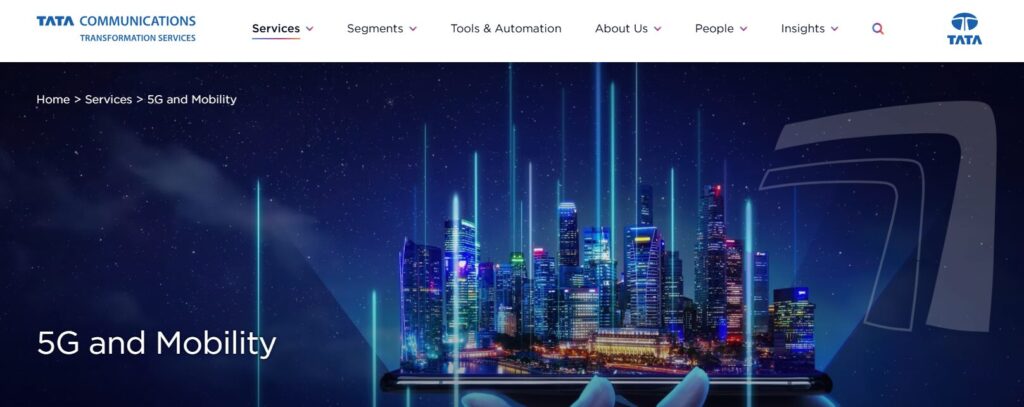
Source – Tata Communications
Through its 5G Mobile Private Network Services arm, Tata offers end-to-end planning, deployment, and management of enterprise networks. It delivers private 5G connectivity integrated with SD-WAN, multi-access edge compute environments, and automation driven by a spectrum of certified tools. Their modular approach reduces cycles for deployment and delivers vendor-agnostic architecture aligned with enterprise objectives.
Tata Communications supports enterprise use cases across manufacturing, logistics, healthcare, ports, and retail. Its strength lies in creating full-stack private wireless systems, with integrated edge, analytics, and managed services. This enables resilient, secure, and scalable enterprise operations.
4. Capgemini
Capgemini is a global integrator that specializes in combining 5G and Edge solutions to power intelligent industries and smart infrastructure. It operates multiple 5G Labs designed to help enterprises experiment with mission-critical cases within a controlled environment.

Source – Capgemini
Capgemini supports private 5G network deployment with integrated Edge compute and software frameworks that accelerate time to market. These include modular architectures for both cloud-native core and open radio access network integration, as well as solutions extending connectivity to satellite and mission-critical LTE/5G services.
The firm also fosters interoperability between IT and OT by leveraging its telecom engineering heritage to deploy flexible and vendor-neutral solutions. With capabilities tailored to industries such as manufacturing, energy, transportation, and public infrastructure, Capgemini enables enterprises to seamlessly integrate 5G and Edge into their broader digital transformation roadmaps.
5. Wipro
Wipro offers enterprise-grade private 5G through partnerships with Nokia and Cisco, supported by its proprietary platforms for deployment, monitoring, and orchestration. Their Nokia-backed solution integrates private wireless connectivity into industrial operations, delivering low-latency data streams, high reliability, and enhanced security architecture.
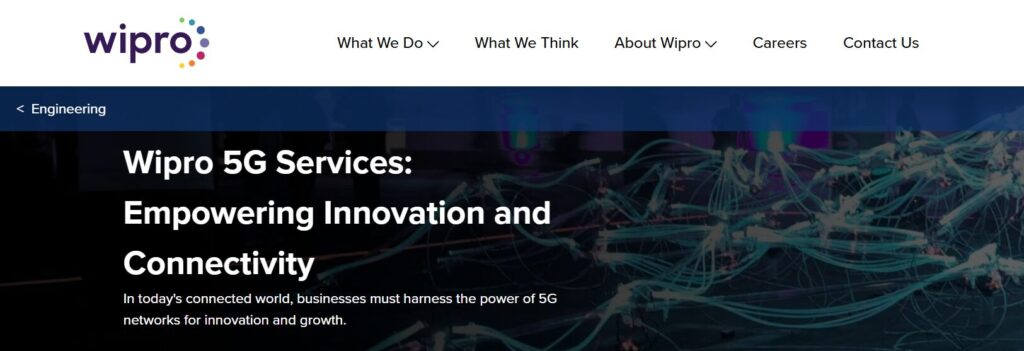
Source – Wipro
Wipro also offers a managed private 5G‑as‑a‑service in partnership with Cisco, enabling seamless integration with existing LAN, WAN, and cloud workloads via a unified management interface.
Their 5G Def‑i platform combines network, application layer, and cloud-native orchestration to accelerate asset connectivity, automation, and real-time data handling at the edge.
Wipro supports enterprises across manufacturing, energy, utilities, transportation, and entertainment, providing private wireless networks that connect IT and OT environments securely and efficiently.
6. NTT DATA India
NTT DATA delivers comprehensive private 5G solutions explicitly crafted for sectors such as manufacturing, automotive, transportation, energy, and utilities. Their turnkey approach includes everything from initial network design and equipment selection to full deployment and ongoing managed services. These are availablel under flexible models like Infrastructure‑as‑a‑Service or Network‑as‑a‑Service.

Source – NTT Data
Security and operational continuity are integral to every deployment. NTT DATA embeds multi-layer access control, complete visibility, and resilience mechanisms to manage enterprise risk effectively.
On the use-case front, the company enables connected-worker platforms, autonomous vehicle orchestration, machine-vision analytics for predictive maintenance, and mission-critical communications tailored to industrial environments.
In partnership with Palo Alto Networks, they offer managed private 5G security services that combine NGFW, real-time threat detection, and integrated monitoring to strengthen OT deployments without performance loss.
7. L&T Technology Services
L&T Technology Services offers a wide range of 5G services across planning, deployment, testing, and support.
The company provides system integration for private 5G networks. It also supports multi-level network operations and offers testing and validation for both devices and infrastructure components.

Source – L&T
Their work spans multiple layers of the 5G stack. This includes application deployment on edge environments, integration with IT and OT systems, and use case development for industries like manufacturing and utilities.
L&T also provides support for network orchestration, service assurance, and performance optimization after deployment.
Rather than specializing in a single domain, L&T positions itself as an end-to-end service provider. It covers both the connectivity layer and the broader operational systems that surround it.
This includes capabilities in mobile edge computing, interoperability testing, and managed services designed around enterprise use cases.
Questions to Ask Before Choosing a 5G System Integrator
Not all system integrators are built the same. While many claim 5G capabilities, only a few can align the complexity of real-world infrastructure with the performance demands of modern enterprises.
Before you make a decision, ask these five questions:
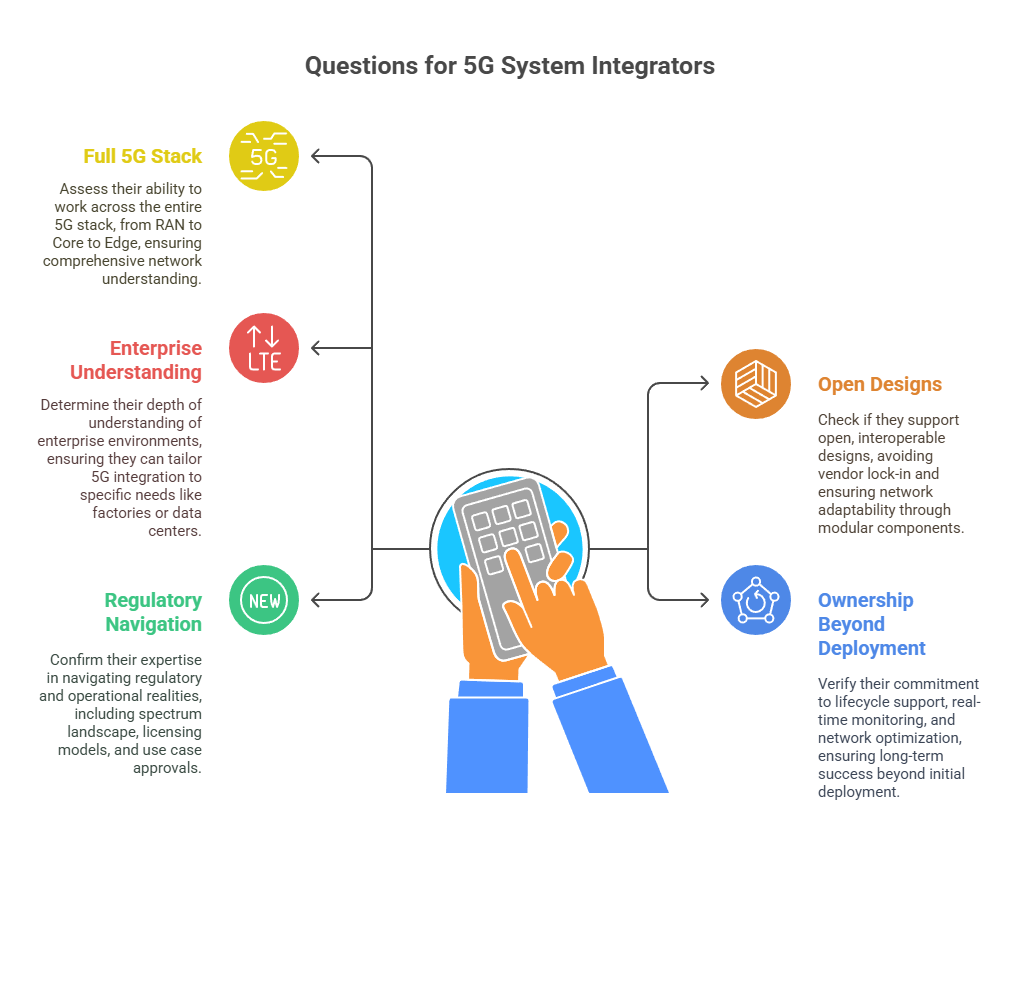
1. Can they work across the full 5G stack from RAN to Core to Edge?
Deploying access points is one thing. Architecting full-stack, production-ready connectivity is another key aspect. It is vital to partner with vendors who understand every layer of the network.
2. Do they support open, interoperable designs?
Enterprises shouldn’t be locked into a single OEM or cloud ecosystem. The right integrator builds around open interfaces and modular components, so your network stays adaptable.
3. How deeply do they understand enterprise environments?
Integrating 5G into a factory, data center, or logistics hub isn’t a one-size-fits-all job. You need a partner who speaks both the language of IT and OT, and can tailor the rollout accordingly.
4. Can they take ownership beyond deployment?
5G is not a set-and-forget project. Lifecycle support, real-time monitoring, and network optimization are non-negotiable for long-term success.
5. Are they equipped to navigate regulatory and operational realities in India?
The spectrum landscape, licensing models, and use case approvals are evolving fast. Your partner should already know the terrain.
The ability to answer these questions is foundational. The good news is that Datacipher brings this depth by default. From multi-vendor integration to real-time monitoring, from private network rollouts to long-term managed support, we are purpose-built to handle 5G complexity without compromising enterprise stability.
Let’s look at why we stand out among the other 5G system integrators in India.
Why Datacipher Stands Out Among 5G System Integrators in India?
Among the handful of 5G system integrators in India capable of handling full-stack enterprise deployments, Datacipher brings something distinct to the table. We offer depth across both network engineering and long-term operational maturity.
Unlike firms that focus only on radio or infrastructure, we understand that successful 5G adoption requires aligning private LTE, edge computing, cybersecurity, and data orchestration into a cohesive system.
Our experience spans across SD-WAN, SASE, and large-scale wireless rollouts, making us well-positioned to handle the integration complexity that comes with 5G.
Whether you’re deploying a private 5G network inside a factory, extending metro coverage for logistics, or enabling ultra-low latency applications, we don’t just deliver connectivity. We deliver systems that work.
If you’re looking for a partner who understands both the promise and the pitfalls of 5G, we bring that clarity. We design for scale without sacrificing reliability.
Want to deploy 5G for your enterprise? Talk to our experts to get started.
Frequently Asked Questions
#1. Do I need a 5G system integrator if I’m already using SD-WAN or SASE?
Yes. SD-WAN and SASE are important pieces, but 5G integration brings new layers, like traffic prioritization, ultra-low latency design, and private network orchestration. A 5G system integrator ensures these elements work together, optimizing both your legacy stack and new infrastructure.
#2. Can mid-sized enterprises afford to deploy private 5G networks?
Absolutely. Private 5G has become more accessible thanks to shared spectrum models and modular deployment options. The right integrator can design a solution tailored to your scale, helping you unlock better indoor coverage, secure IoT operations, and real-time data flow without enterprise-level budgets.
#3. What’s the difference between 5G integrators and telecom providers?
Telecom providers deliver connectivity. 5G system integrators make that connectivity work within your enterprise environment. They design the architecture, handle deployment across layers, ensure security, and tune the system to support your specific applications, from automation to edge analytics.

